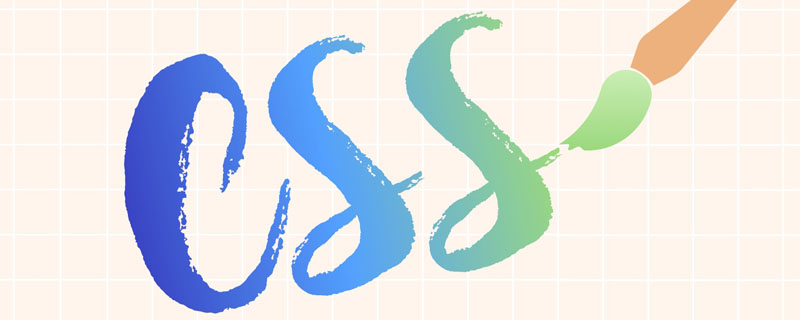 Web Front-end
Web Front-end
 CSS Tutorial
CSS Tutorial
 10 high-frequency interview questions about css in web front-end interviews
10 high-frequency interview questions about css in web front-end interviews
10 high-frequency interview questions about css in web front-end interviews
1. What is the BFC mechanism
BFC (Block Formatting Context), Block-level formatting Context is an independent rendering area that isolates elements inside the BFC from external elements so that the positioning of internal and external elements will not affect each other.
- Trigger condition (any one of the following)
- The value of float is not none
- The value of overflow is not visible
- The value of display is One of table-cell, table-caption and inline-block
- The value of position is not any one of static or releative
Under IE, Layout can be triggered through
zoom:1
- The difference between BFC layout and ordinary document flow layout:
BFC layout rules:
- Floating elements will have their height calculated by their parent (the parent element triggers BFC)
- Non-floating elements will not cover the position of floating elements (non-floating elements trigger BFC) )
- Margin will not be passed to the parent (the parent triggers BFC)
- The upper and lower margins of two adjacent elements belonging to the same BFC will overlap
- Normal document flow layout : The height of floating elements will not be calculated by the parent
- Non-floating elements will cover the position of floating elements
- margin will be passed to the parent element
- Two adjacent The margins above and below the element will overlap
- Application under development
- Prevent margin overlap
- You can include floating elements - clear internal floats (clear floating ones The principle is that both p's are located in the same BFC area)
- Adaptive two-column layout
can prevent elements from being covered by floating elements
Special recommendation:Summary of CSS interview questions in 2020 (latest)
##2. The new selectors and attributes in CSS3
are just listed here. For specific usage, please check my article about new selectors and attributes in CSS3- Attributes Selector
|
|
|
||||||||||||||||||||||||||||||||||||||||||||||||||||||||||||||||||||||||||
|---|---|---|---|---|---|---|---|---|---|---|---|---|---|---|---|---|---|---|---|---|---|---|---|---|---|---|---|---|---|---|---|---|---|---|---|---|---|---|---|---|---|---|---|---|---|---|---|---|---|---|---|---|---|---|---|---|---|---|---|---|---|---|---|---|---|---|---|---|---|---|---|---|---|---|---|
|
#E[att^="val"] |
The element whose attribute att value starts with "val" |
||||||||||||||||||||||||||||||||||||||||||||||||||||||||||||||||||||||||||
|
E[att$="val"] |
The element whose attribute att value ends with "val" |
||||||||||||||||||||||||||||||||||||||||||||||||||||||||||||||||||||||||||
| ##E[att*="val"] |
The value of the attribute att contains the "val" string element
|
The above is the detailed content of 10 high-frequency interview questions about css in web front-end interviews. For more information, please follow other related articles on the PHP Chinese website!

Hot AI Tools

Undresser.AI Undress
AI-powered app for creating realistic nude photos

AI Clothes Remover
Online AI tool for removing clothes from photos.

Undress AI Tool
Undress images for free

Clothoff.io
AI clothes remover

Video Face Swap
Swap faces in any video effortlessly with our completely free AI face swap tool!

Hot Article

Hot Tools

Notepad++7.3.1
Easy-to-use and free code editor

SublimeText3 Chinese version
Chinese version, very easy to use

Zend Studio 13.0.1
Powerful PHP integrated development environment

Dreamweaver CS6
Visual web development tools

SublimeText3 Mac version
God-level code editing software (SublimeText3)

Hot Topics
 1659
1659
 14
14
 1415
1415
 52
52
 1309
1309
 25
25
 1257
1257
 29
29
 1231
1231
 24
24
 Google Fonts Variable Fonts
Apr 09, 2025 am 10:42 AM
Google Fonts Variable Fonts
Apr 09, 2025 am 10:42 AM
I see Google Fonts rolled out a new design (Tweet). Compared to the last big redesign, this feels much more iterative. I can barely tell the difference
 How to Create an Animated Countdown Timer With HTML, CSS and JavaScript
Apr 11, 2025 am 11:29 AM
How to Create an Animated Countdown Timer With HTML, CSS and JavaScript
Apr 11, 2025 am 11:29 AM
Have you ever needed a countdown timer on a project? For something like that, it might be natural to reach for a plugin, but it’s actually a lot more
 HTML Data Attributes Guide
Apr 11, 2025 am 11:50 AM
HTML Data Attributes Guide
Apr 11, 2025 am 11:50 AM
Everything you ever wanted to know about data attributes in HTML, CSS, and JavaScript.
 A Proof of Concept for Making Sass Faster
Apr 16, 2025 am 10:38 AM
A Proof of Concept for Making Sass Faster
Apr 16, 2025 am 10:38 AM
At the start of a new project, Sass compilation happens in the blink of an eye. This feels great, especially when it’s paired with Browsersync, which reloads
 How We Created a Static Site That Generates Tartan Patterns in SVG
Apr 09, 2025 am 11:29 AM
How We Created a Static Site That Generates Tartan Patterns in SVG
Apr 09, 2025 am 11:29 AM
Tartan is a patterned cloth that’s typically associated with Scotland, particularly their fashionable kilts. On tartanify.com, we gathered over 5,000 tartan
 How to Build Vue Components in a WordPress Theme
Apr 11, 2025 am 11:03 AM
How to Build Vue Components in a WordPress Theme
Apr 11, 2025 am 11:03 AM
The inline-template directive allows us to build rich Vue components as a progressive enhancement over existing WordPress markup.
 PHP is A-OK for Templating
Apr 11, 2025 am 11:04 AM
PHP is A-OK for Templating
Apr 11, 2025 am 11:04 AM
PHP templating often gets a bad rap for facilitating subpar code — but that doesn't have to be the case. Let’s look at how PHP projects can enforce a basic
 Programming Sass to Create Accessible Color Combinations
Apr 09, 2025 am 11:30 AM
Programming Sass to Create Accessible Color Combinations
Apr 09, 2025 am 11:30 AM
We are always looking to make the web more accessible. Color contrast is just math, so Sass can help cover edge cases that designers might have missed.




